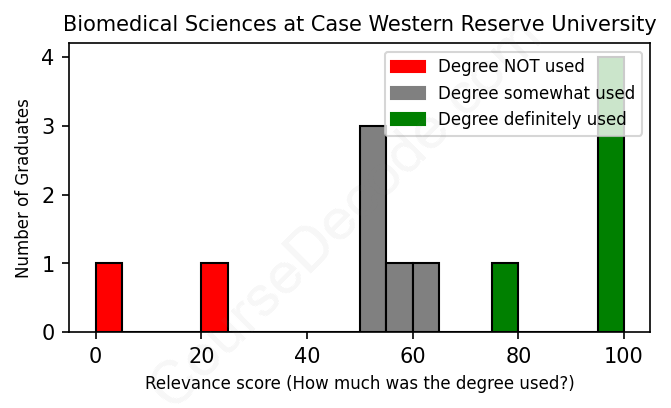
First, some facts. Of the Biomedical Sciences graduates from Case Western Reserve University we've analyzed , here's how many have used (or NOT used) their degree in their career:

These are estimates based on AI analysis of 12 LinkedIn profiles (see below).
The verdict? Slightly below average. Overall, with an average relevance score of 63%, Biomedical Sciences graduates from Case Western Reserve University have a slightly lower likelihood (-4%) of finding work in this field compared to the average graduate across all fields:
And for comparison, here's the chart for all profiles we've looked at across all degrees.
Also, after graduating, only 25% of these graduates have pursued further education other than another Bachelor's degree (such as a Masters degree or other), compared to the average across all profiles of 35%. This suggests a Bachelors degree is enough for most Biomedical Sciences graduates, and it's normal to look for work straight after graduation.
See the details:
|
Relevance score: 50% We think this person has gone into a career only somewhat relevant to their degree. We think this person has gone into a career only somewhat relevant to their degree.
DEGREE INFOGraduated in 2021 from Case Western Reserve University with a Bachelor of Science - BS in Biomedical Sciences. Also pursued further education since (see below). JOB HISTORY SINCE GRADUATIONMechanical Engineering R&D Co-Op Mammotome Jan 2022 - Aug 2022 Technical Solutions Engineer  Epic Sep 2022 - Aug 2023 Design Engineer  Mammotome Sep 2023 - Present FURTHER DEGREES DONE SINCE GRADUATINGMaster's degreeCase Western Reserve University 2021 - 2022 ABOUTDesign Engineer at Mammotome. |
The top 10 most common jobs done by the graduates we've analyzed (ranked most common to least) are:
From the profiles you've presented, it looks like graduates from Case Western Reserve University with a degree in Biomedical Sciences have taken on a mix of jobs, some directly related to the field and others that barely scratch the surface. Common positions for these graduates include research roles like Research Assistants and Postdoctoral Research Fellows, which clearly use their biomedical knowledge. On the other hand, there's also a significant number of graduates who veered into engineering, consulting, and management roles, which often don't require a strong foundation in biomedical sciences. Jobs like Senior Solutions Architect or Management Consulting Senior Analyst are more about analytical and management skills rather than diving deep into biomedical applications.
The trends indicate that while many graduates find relevant positions in the biomedical research and healthcare sectors, others blend their degree with engineering or business, resulting in a mixed bag regarding the relevance of their roles. Positions such as Biomedical Technician or Biomechanics Engineer are great examples of those that utilize their education directly. However, others, like Data Engineer or Mechanical Design Engineer, show a disconnect from the core biomedical principles. So, in a nutshell, while a solid chunk of these jobs relates well to Biomedical Sciences, a fair number of graduates end up in roles where their degree isn't really a requirement, showcasing the versatility but also the potential dilution of their specialized knowledge in the job market.
Here is a visual representation of the most common words in job titles for Biomedical Sciences graduates (this is across all Biomedical Sciences graduates we've analyzed, not just those who went to Case Western Reserve University):

The graduates from Case Western Reserve University with degrees in Biomedical Sciences seem to follow quite a diverse range of career paths, but there's a definite trend toward positions that relate closely to the biomedical and engineering fields. For many, their first jobs out of college are either in research or as engineers in medical device companies. For instance, several graduates started as research assistants or entered engineering roles shortly after graduation. This indicates that the foundational knowledge gained during their studies effectively prepares them for positions that are relevant to their field right away.
Looking five to ten years down the line, a significant number of these graduates have moved into more advanced positions or have even transitioned into different roles that leverage their biomedical background. While some have stayed in the healthcare and engineering sectors, others have ventured into roles in consulting and product management. Overall, it seems the majority have found ways to build successful careers that reflect their educational background, even if some paths diverged a bit from traditional biomedical roles. So, it appears that a degree in Biomedical Sciences from Case Western can indeed open up a variety of promising career trajectories, whether directly in the biomedical field or in roles that utilize the analytical and technical skills they developed during their studies.
Getting a Bachelor’s degree in Biomedical Sciences at Case Western Reserve University is definitely no walk in the park, but it’s not insurmountable either. You’ll find that the coursework can be rigorous and fast-paced, with a heavy emphasis on the sciences—think biology, chemistry, and even some math sprinkled in. If you enjoy diving deep into complex topics and can handle some challenging labs and research projects, you’ll probably find it rewarding. It's about average in difficulty compared to other STEM degrees, so be prepared to put in the work, but also know that if you’re passionate about the material, it can be a really fulfilling experience! Just stay organized and don't hesitate to reach out for help when you need it.
Most commonly, in the LinkedIn profiles we've looked at, it takes people 4 years to finish a Bachelor degree in Biomedical Sciences.
Looking at the career paths of these Biomedical Sciences grads from Case Western Reserve University, it seems like they've done pretty well for themselves in terms of earning potential. Those who graduated a bit earlier, like in 2010 and 2011, have moved into some solid positions, especially in tech and management, indicating they're likely making decent money now. Meanwhile, the 2014 grads have carved out diverse careers in consulting and engineering, which usually come with good salaries, especially as they climb the ranks. The more recent grads seem to be starting strong, too, with roles in engineering and product management, which are generally pretty lucrative fields. So, overall, it looks like most of them have landed on their feet and are probably doing alright financially!
Here is a visual representation of the most common words seen in the "about" section of LinkedIn profiles who have a Bachelor degree in Biomedical Sciences (this is across all Biomedical Sciences graduates we've analyzed, not just those who went to Case Western Reserve University). This may or may not be useful:

Here are all colleges offering a Bachelor degree in Biomedical Sciences (ordered by the average relevance score of their Biomedical Sciences graduates, best to worst) where we have analyzed at least 10 of their graduates:
| College | Score | Count |
|---|---|---|
 Western Michigan University Western Michigan University
|
81 | 17 |
 Marquette University Marquette University
|
78 | 29 |
 University of Michigan University of Michigan
|
77 | 10 |
 Colorado State University Colorado State University
|
77 | 19 |
 University at Buffalo University at Buffalo
|
75 | 18 |
 California Polytechnic State University-San Luis Obispo California Polytechnic State University-San Luis Obispo
|
74 | 13 |
 University of Connecticut University of Connecticut
|
74 | 15 |
 Texas A&M University Texas A&M University
|
73 | 59 |
 Auburn University Auburn University
|
71 | 26 |
 Northern Arizona University Northern Arizona University
|
71 | 15 |
 Rensselaer Polytechnic Institute Rensselaer Polytechnic Institute
|
70 | 10 |
 University of Central Florida University of Central Florida
|
69 | 26 |
 University of South Florida University of South Florida
|
68 | 48 |
 Georgia Institute of Technology Georgia Institute of Technology
|
67 | 41 |
 The Ohio State University The Ohio State University
|
64 | 14 |
 Rochester Institute of Technology Rochester Institute of Technology
|
64 | 12 |
 Case Western Reserve University Case Western Reserve University
|
63 | 12 |
 Grand Valley State University Grand Valley State University
|
59 | 35 |
 Arizona State University Arizona State University
|
58 | 12 |